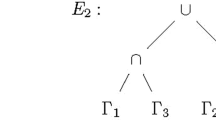Abstract
The Lisbon voting system of the Council of the European Union, which became effective in November 2014, cannot be represented as the intersection of six or fewer weighted games, i.e., its dimension is at least 7. This sets a new record for real-world voting bodies. A heuristic combination of different discrete optimization methods yields a representation as the intersection of 13,368 weighted games. Determination of the exact dimension is posed as a challenge to the community. The system’s Boolean dimension is proven to be 3.
Similar content being viewed by others
Notes
We remark that rounding populations to, say, thousands is common in applied work because this simplifies computations, e.g., of the voting power distribution in the EU Council. Rounding, however, leads to a different set of winning coalitions, i.e., is analyzing ‘wrong’ rules.
For example, every 16-member winning coalition is minimal but few are also shift-minimal.
The example is the smallest possible: all complete simple games with \(n\le 5\) are weighted.
Just to give an example, \(\big \langle \{4,\ldots ,28\},\{1,3,4,5,7,8, 10,12,15,\ldots ,28\}; \{1,4,5,7,\ldots ,12, 14,\ldots , 28\}, \{3,\ldots ,8,10,12, 13,15,\ldots ,28\}\big \rangle \) is a 2-trade for the first two losing coalitions.
For the general ILP modeling of weighted games we refer to [11].
In order to check this intuition, we have computed the difference \(\left\| \mathcal {P}(v_{\text {EU28}})-\mathcal {P}(v_1\wedge v_2)\right\| _1\) for four different power measures \(\mathcal {P}\) (cf. [1]): it is only around \(7 \times 10^{-7}\) for the least square nucleolus and \(9 \times 10^{-7}\) for the normalized Banzhaf index, but 0.00537 for the Shapley-Shubik index and 0.167 for the nucleolus.
References
Alonso-Meijide, J., Álvarez-Mozos, M., Fiestras-Janeiro, M.: The least square nucleolus is a normalized Banzhaf value. Optim. Lett. 1–7 (to appear). doi:10.1007/s11590-014-0840-9
Cheung, W.-S., Ng, T.-W.: A three-dimensional coting system in Hong Kong. Eur. J. Oper. Res. 236(1), 292–297 (2014)
De\({\check{\i }}\)neko, V.G., Woeginger, G.J.: On the dimension of simple monotonic games. Eur. J. Oper. Res. 170(1), 315–318 (2006)
Faliszewski, P., Elkind, E., Wooldridge, M.: Boolean combinations of weighted voting games. In: Proceedings of the 8th International Conference on Autonomous Agents and Multiagent Systems, pp. 185–192. International Foundation for Autonomous Agents and Multiagent Systems (2009)
Freixas, J.: The dimension for the European Union Council under Nice rules. Eur. J. Oper. Res. 156(2), 415–419 (2004)
Freixas, J., Marciniak, D.: On the notion of dimension and codimension. In: Petrosyan, L. A., Zenkevich, N. A. (eds) Proceedings of the 3rd International Conference Game Theory and Management, pp. 67–81. The International Society of Dynamic Games (Russian Chapter) (2010)
Freixas, J., Puente, M.A.: Dimension of complete simple games with minimum. Eur. J. Oper. Res. 188(2), 555–568 (2008)
Gvozdeva, T., Slinko, A.: Weighted and roughly weighted simple games. Math. Social Sci. 61(1), 20–30 (2011)
Kilgour, M.D.: A formal analysis of the amending formula of Canada’s Constitution Act. Can. J. Pol. Sci. 16, 771–777 (1983)
Kurz, S.: On minimum sum representations for weighted voting games. Ann. Oper. Res. 196(1), 361–369 (2012)
Kurz, S.: On the inverse power index problem. Optimization 61(8), 989–1011 (2012)
Taylor, A.D.: Mathematics and Politics. Springer, Berlin (1995)
Taylor, A.D., Zwicker, W.S.: Weighted voting, multicameral representation, and power. Games Econ. Behav. 5(1), 170–181 (1993)
Taylor, A.D., Zwicker, W.S.: Simple Games: Desirability Relations, Trading and Pseudoweightings. Princeton University Press, New Jersey (1999)
Acknowledgments
The authors thank two anonymous referees for constructive suggestions. The usual caveat applies.
Author information
Authors and Affiliations
Corresponding author
Rights and permissions
About this article
Cite this article
Kurz, S., Napel, S. Dimension of the Lisbon voting rules in the EU Council: a challenge and new world record. Optim Lett 10, 1245–1256 (2016). https://doi.org/10.1007/s11590-015-0917-0
Received:
Accepted:
Published:
Issue Date:
DOI: https://doi.org/10.1007/s11590-015-0917-0
Keywords
- Simple games
- Weighted games
- Dimension
- Real-world voting systems
- Set covering problem
- Computational challenges



